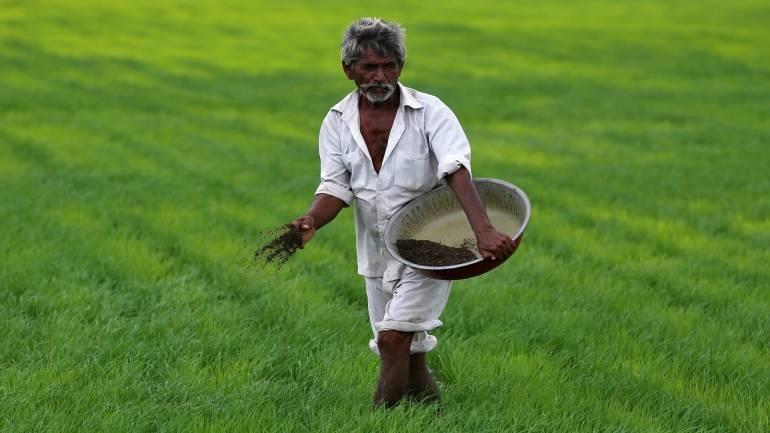Farmers’ Distress Highest Among the Tenant Farmers in Telangana: Survey

Image Coutesy: Moneycontrol
More than 75 per cent of the farmers who committed suicide in Telangana during the last four years were tenant farmers, finds a study conducted by Rythu Swarajya Vedika (RSV), a non-governmental organisation.
For the study, focused mainly on land ownership and tenancy in relation to farmer suicides, RSV, in collaboration with a team of students from Tata Institute of Social Sciences, Hyderabad, during May-June had visited 692 families of victims who committed suicide between June 2014 and April this year. Of the total 3,500 farmers, who have committed suicides during the period, this is a sample size of about 20 per cent. Telangana stands second in the country in the number of farmer suicides.
The study revealed that about 13.5 per cent of the victims are landless, another 45 per cent are marginal farmers (those owning land less than or up to 2.5 acres) and 34 per cent are small farmers (with land-holdings between 2.5 to 5 acres). That is 93 per cent of the farmers suicides are by marginal, small and landless farmers.
Out of the 692 families surveyed, it is found that 520 or 75.14 per cent are tenant farmers (farmers who had taken land on lease to cultivate it). Out of this, while 18 per cent were totally landless, 46 per cent were marginal land-holders and another 30 per cent were small farmers. That is a whopping 94 per cent of the tenant farmers who committed suicides are small, marginal and landless farmers.
Private Loans Pressure
On the pattern of debt, which pushes the tenant farmers to consider suicide, the study found that the access to bank loans was very limited, especially among marginal and landless. Thus, most of them are dependent on private loans to meet their cultivation needs. While 265 out of the 520 tenant farmers who committed suicide reported no outstanding bank loans, they had taken close to Rs 4 lakh on average from private lenders. This reveals that the pressure of the private loans played a significant role. This also suggests that these victims did not even avail the benefits from the government measures such as loan waivers.
The study found that the average bank loan among landless farmers was only Rs 11,000, whereas the average outstanding private loan was Rs 3.64 lakhs. Also, a large section of tenant farmers were having no bank loans. Seventy-five out of 93 landless tenant farmers and 55 out of 115 tenant farmers with 0 to 1 acre land-holdings had no bank loans at the time of their suicide.
Cropping Pattern
In terms of cropping pattern, 81.4 per cent of the farm suicide families cultivated mainly cotton, and many of them also cultivated multiple crops on different parts of their land, followed by 36 per cent, who cultivated paddy, 32 per cent maize and 10 per cent, who cultivated red gram.
Social Category
In terms of social category, it is found that the highest percentage of farmer suicides were by Backward Castes – 61 per cent, followed by Scheduled Castes (17 per cent) and Scheduled Tribes (11 per cent).
RSV also surveyed three villages in Telangana to find out the benefits received by the farmers from the state government’s support schemes and the state of tenant farmers in particular. The villages are Pottipalli in Sadashivpet mandal in Sangareddy district, Itikyala in Laksettipeta mandal of Mancherial district and Gimma in Jainath mandal in Adilabad district.
Telangana government has recently launched Rythu Bandhu Scheme – farmers Investment support Scheme – according to which, Rs 8000 per acre per year will be given to the agricultural land owners. However, tenant farmers across the state have led protests demanding the government to include them into the scheme. However, the ruling Telangana Rashtra Samiti government under K Chandrashekar Rao denied to do so.
While the state government has been asserting that the tenant farmers are less than 20 per cent, in the survey of the three villages, it has been revealed that in each village, about 25 to 40 per cent of households are tenant farmers who have been leasing in land for cultivation.
In the three villages surveyed, it is found that the majority of the agricultural land owners are involved in other occupations. Only 15.5 per cent of the land owners have agriculture as their occupation, while 50 per cent of them are either employees or businesspersons and about 10 per cent are old-aged persons leasing their land. Furthermore, it is found that about 60 per cent of the land owners leasing out their lands are living outside their villages.
Despite the Rythu Bandhu Scheme offering investment support, it is found that the land owners did not even reduce the leasing rent for tenant farmers.
Get the latest reports & analysis with people's perspective on Protests, movements & deep analytical videos, discussions of the current affairs in your Telegram app. Subscribe to NewsClick's Telegram channel & get Real-Time updates on stories, as they get published on our website.
























